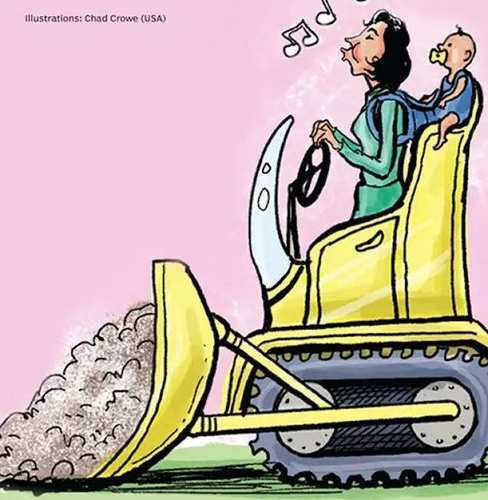
Tiger moms and helicopter dads are passé. Checks out the latest parenting styles on the block
The scrunchy parent
We are not talking about the fabric-covered rubber bands that are used to tie hair into a pony-tail. Scrunchy is a term used for a new, rather flexible approach to parenting. This style is named such as it is a combination of two other parenting styles — silky and crunchy. Silky moms believe in convenience and happily use disposable diapers and hand over an iPad or bag of chips to keep their bub busy on a drive. Crunchy moms take a more idealistic approach, opting for natural births, plastic-free toys and cloth diapers. Scrunchy parents fall right in between. So, they may spend on organic fruits but don’t mind using regular diapers. Experts hail this parenting style as it eases the pressure on parents to do everything right.
The lighthouse parent
Unlike the helicopter parent who hovers over the child and controls every little aspect, the lighthouse parent simply guides the child while allowing them the freedom to grow and learn. This parent is sturdy and reliable but not interfering, just like a lighthouse. American paediatrician Dr Kenneth Ginsburg has proposed lighthouse parenting as the ideal style of parenting in his upcoming manual which will be published in March 2025 as it helps children grow into emotionally healthy adults who have deep, enduring relationships with their parents.
The bulldozer parent
A bulldozer parent is one who knocks down all the obstacles in the child’s path to ensure she succeeds. Such parents are also known as snowplough or lawnmower parents as they literally clear the child’s way to prevent the child from experiencing pain or hardships. While parents often bulldoze with the right intentions, it can lead to kids becoming excessively dependent and struggling with decision-making when they grow up. Counsellors have warned that kids who have bulldozer parents may grow up with a sense of entitlement and may not have the skills to regulate their emotions when something negative happens. Did you know Hollywood star Eva Mendes admitted that she and Ryan Gosling are very “controlling, bulldozing parents”?
The almond/ apple watch parent
This parenting style came into focus when an old video of a teenage Gigi Hadid talking to her mom resurfaced on Tik-Tok last year. In the video, when Gigi told her mom she is feeling really weak and that she had just half an almond, the latter asked her to “have a couple of almonds and chew them really well.” The video went viral and the ‘Almond mom’ phenomenon was born as many young women shared their own experience of growing up with diet-obsessed mothers who panicked if they gained even half a pound. While almond moms focus on food habits, Apple Watch dads are fathers who are so nuts about fitness that they ensure their child covers the required 10k steps or 100 squats a day no matter what. Mental health experts believe this parenting style is an extension of the parent’s own obsessions and fatophobia. It can leave a lasting impact on the child’s self-esteem and can cause eating disorders or depression.
The intensive parent
The responsibility of raising the next generation of humans coupled with the pressure to keep up with the ideals set by social media is leading many moms and dads to become ‘intensive parents’. This parenting style entails investing a significant amount of time, money and energy into raising children, as per a study published in the Frontiers in Psychology. Experts say that a significant proportion of today’s parents, especially mothers, follow this style without even realising it. While a regular parent would relax after giving the child TV time, the intensive parent talks to the child at regular intervals to make sure she is not staring at the screen non-stop and is getting the stipulated breaks as advised by doctors they follow on the Gram. While this approach may benefit the child (sometimes), it is extremely stressful for the parent. Intensive parents often second-guess their parenting decisions as well as spend a lot of time gathering information on parenting and child psychology. This anxiety-driven parenting style is one of the factors for the rising mental health crisis. Experts say parents need to stop over-researching online and also need to step back sometimes, allowing their children to manage themselves.
 Tiger moms and helicopter dads are passé. Checks out the latest parenting styles on the block
Tiger moms and helicopter dads are passé. Checks out the latest parenting styles on the block